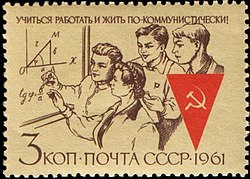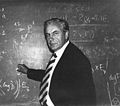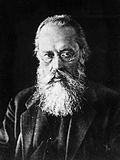List of Russian mathematicians
Appearance

This list of Russian Federation.
Alphabetical list
A

- Georgy Adelson-Velsky, inventor of AVL tree algorithm, developer of Kaissa, the first world computer chess champion
- Sergei Adian, known for his work in group theory, especially on the Burnside problem
- Aleksandr Aleksandrov, developer of CAT(k) space and Alexandrov's uniqueness theoremin geometry
- Alexandroff compactification and the Alexandrov topology
- Dmitri Anosov, developed Anosov diffeomorphism
- Arnold's rouble problems
B
- Alexander Beilinson, influential mathematician in representation theory, algebraic geometry and mathematical physics
- Bernstein inequalities in probability theory
- Nikolay Bogolyubov, mathematician and theoretical physicist, author of the edge-of-the-wedge theorem, Krylov–Bogolyubov theorem, describing function and multiple important contributions to quantum mechanics
- Vladimir Berkovich, developed Berkovich spaces
- Viktor Bunyakovsky, noted for his work in theoretical mechanics and number theory, and is credited with an early discovery of the Cauchy–Schwarz inequality
- Humboldt Prizewinner
C
Chebyshev
- Georg Cantor, inventor of set theory. Cantor was born into the Russian Empire, moving to Saxony with his family at age 11.
- Sergey Chaplygin, author of Chaplygin's equation important in aerodynamics and notion of Chaplygin gas.
- Nikolai Chebotaryov, author of Chebotarev's density theorem
- Pafnuti Chebyshev, prominent tutor and founding father of Russian mathematics, contributed to probability, statistics and number theory, author of the Chebyshev's inequality, Chebyshev distance, Chebyshev function, Chebyshev equationetc.
- Sergei Chernikov, significant contributor to both infinite group theory (developer of Chernikov groups), and linear programming.
D
- Soviet Student Olympiadin mathematics
- Vladimir Drinfeld, mathematician and theoretical physicist, introduced quantum groups and ADHM construction, Fields Medal winner
- Eugene Dynkin, developed Dynkin diagram, Doob–Dynkin lemma and Dynkin system in algebra and probability
E
Euler
- Dmitri Egorov, known for significant contributions to the areas of differential geometry and mathematical analysis.
- Euler's number, Euler circles etc.) Although Swiss born Euler spent most of his life in St. Petersburg.
F
- Ivan Fesenko, number theorist
- New Chronology
- Alexander Alexandrovich Friedmann (also spelled Friedman or Fridman); He was a Russian and Soviet physicist and mathematician. He originated the pioneering theory that the universe is expanding, governed by a set of equations he developed known as the Friedmann equations.
Alexander Friedmann Known for Friedmann equations Friedmann–Lemaître–Robertson–Walker metric
- space groupsof crystals
G
Gromov
- Boris Galerkin, developed the Galerkin method in numerical analysis
- Gelfand triple, integral geometryetc.
- Gelfond's theorem, provided means to obtain infinite number of transcendentals, including Gelfond–Schneider constant and Gelfond's constant, Wolf Prize in Mathematicswinner
- Gerschgorin circle theoremfame
- differential equations
- Valery Goppa, inventor of Goppa codes, and algebraic geometry codes in the field of algebraic geometry
- Gromov norm, Gromov productetc., Wolf Prize winner
K
Kovalevskaya
- Nobel Prize in Economicswinner
- Anatoly Karatsuba, developed the Karatsuba algorithm (the first fast multiplication algorithm)
- Fields medalrecipient)
- Ellipsoid algorithm for linear programming
- Khinchin inequality in probability theory
- toric varieties, Jeffery–Williams Prizewinner
- Andrey Kolmogorov, preeminent 20th century mathematician, Wolf Prize winner; multiple contributions to mathematics include: probability axioms, Chapman–Kolmogorov equation and Kolmogorov extension theorem in probability; Kolmogorov complexity etc.
- Kontsevich integral and Kontsevich quantization formula, Fields Medal winner
- Aleksandr Korkin,
- sampling theorem
- Kovalevskaya top
- Kravchuk matrix
- Krein space, Wolf Prize winner
- Alexander Kronrod, developer of Gauss–Kronrod quadrature formula and Kaissa, the first world computer chess champion
- Aleksey Nikolaevich Krylov, first developed the method of Krylov subspace, still widely used numerical method for linear problems
- Nikolay Krylov, author of the edge-of-the-wedge theorem, Krylov–Bogolyubov theorem and describing function
- Aleksandr Kurosh, author of the Kurosh subgroup theorem and Kurosh problem in group theory
L
Lobachevsky

- Olga Ladyzhenskaya, made major contributions to solution of Hilbert's 19th problem and important Navier–Stokes equations
- Evgeny Landis, inventor of AVL treealgorithm
- Vladimir Levenshtein, developed the Levenshtein automaton, Levenshtein coding and Levenshtein distance
- Boris Levin, Mathematician, famous for his theory of entire functions of completely regular growth; in 1956 established and led influential for almost 40 years mathematical seminar at Kharkov university, Ukraine
- Cook-Levin theorem
- Yuri Linnik, developed Linnik's theorem in analytic number theory
- Lobachevskian or hyperbolic geometry)
- Lazar Lyusternik, Mathematician, famous for work in topology and differential geometry. Codevelops Lyusternik-Schnirelmann theory with Lev Schnirelmann.
- Luzin sets in descriptive set theory
- etc.
M

- Leonty Magnitsky, a director of the Moscow School of Mathematics and Navigation, author of the principal Russian 18th century textbook in mathematics
- Anatoly Maltsev, researched decidability of various algebraic groups, developed the Malcev algebra
- Manin-Mumford conjecture and Manin obstruction in diophantine geometry
- Lie groups, Wolf Prize and Fields Medalwinner
- Markov processes, Markov random field, Markov algorithmetc.
- Andrey Markov, Jr., author of Markov's principle and Markov's rulein logics
- Matiyasevich's theorem in set theory, provided a negative solution for Hilbert's tenth problem
- Mikhail Menshikov, probabilist
- Informatics
- David Milman, Mathematician, famous for his method of extreme points and centers that started geometry of Banach Spaces, and had numerous further applications in Mathematics. It starts with his theorem of extreme points that entered all text books in functional analysis, as Krein-Milman theorem
N
- Mark Naimark, author of the Gelfand–Naimark theorem and Naimark's problem
- Burnside's problem
- Adams–Novikov spectral sequence and Novikov conjecture, Wolf Prize and Fields Medal winner
O
- infinite symmetric groups and Hilbert schemeresearcher, Fields Medal winner
- partial fractions in integration
P
- Fields medal and the first Clay Millennium Prize ProblemsAward (declined both)
- Pontryagin's minimum principle in optimal control
R
- Nevanlinna Prize in 1990 and the Gödel Prize for contributions to computer sciences
S



- differential equations
- Lev Schnirelmann, developed the Lusternik–Schnirelmann category in topology and Schnirelmann density of numbers
- Soviet regime, wrote books and articles that criticised socialism
- Moses Schönfinkel, inventor of combinatory logic
- Sara Shakulova, first female mathematician of Tatar descent
- Sinai billiard, Wolf Prize winner
- Eugen Slutsky, statistician and economist, developed the Slutsky equation and Slutsky's theorem
- triangular lattice, Fields Medalist
- mathematical distributions, co-developer of the first ternary computer Setun
- Vladimir Steklov, mathematician and physicist, founder of Steklov Institute of Mathematics, proved theorems on generalized Fourier series
- Boolean functions, founder of unauthorized Jewish People's University to educate Jews barred from quality universities
T
- Jakow Trachtenberg, developed the Trachtenberg system of mental calculation
- Boris Trakhtenbrot, proved the Gap theorem, developed Trakhtenbrot's theorem
- supercompilation
- ill-posed problems, invented magnetotellurics
U
- Urysohn's Lemma and Fréchet–Urysohn space in topology
V
- multi-valued logics
- Pólya–Vinogradov inequality in analytic number theory
- Vladimir Voevodsky, introduced a homotopy theory for schemes and modern motivic cohomology, Fields Medalist
- Georgy Voronoy, invented the Voronoi diagram
Y
- Egorov's Theorem in mathematical analysis
Z
- restricted Burnside problem; Fields Medalwinner
See also
- List of mathematicians
- List of Russian physicists
- List of Russian scientists
- Science and technology in Russia
